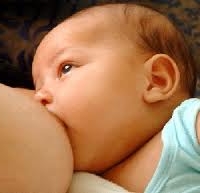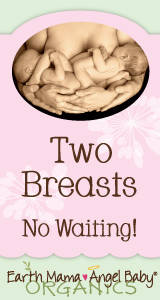Stopping Breastfeeding

Stopping breastfeeding is often an emotional decision. When should you stop breastfeeding? When baby wants to stop, that’s when! What is the hurry? During our lifespan, we only have a short opportunity to nourish our offspring. Stopping breastfeeding is not a decision you should make lightly!
We provide three things to our babies when we breastfeed; nutrition, immunities and comfort. As your baby grows older, he or she will nurse for the emotional comfort -- for the joy of being close to you -- as much as for the nutrition.
Why would you want to cut that short?
Your baby's immune system is developing for the first two years of life. If you breastfeed for your baby's first two years of life you are providing important immunities and protection during this time. So ideally, you should nurse for the first two years of your baby's life. At the very least, we recommend that all women breastfeed for at least the first year of their baby's life.
Read about ALL of the Advantages of Breastfeeding for both you and your baby before deciding to stop.
Believe us, you are going to blink your eyes and find your little darling asking to borrow the car keys! There is no need to rush into stopping breastfeeding.
And for all those “concerned” friends and relatives who want to know how long you plan to nurse, you can tell them with confidence that your baby will stop nursing before her or she starts driving!
Perhaps you are finding breastfeeding too time consuming or feel like you should abandon it because your baby is only nursing for short periods of time. Read Breastfeeding Tips for some great ideas for getting things back on track! Remember, once they are a couple months old, babies can empty a breast in 3-5 minutes, so just because your baby isn't nursing for long don't assume that they are not getting the full nutrition and bonding that they need from you!
If you teach your baby how to have a good nursing early on, as defined by emptying both breasts completely, you will only need to breastfeed every four hours by the time your baby is 4 months old. This provides baby with a nice full tummy, allowing him/her to have a nice two hour nap.
If you prevent your baby from becoming a “nibbler” (defined as not completely emptying your breasts when you nurse and requiring frequent feedings less than every three hours) you will find that baby gets very efficient. Most babies can empty a breast in FIVE minutes or less by the time they are three months old. That means that once your baby is three or four months old you can expect each nursing will only take around ten minutes. You need to nurse at least five or six times in a 24 hour period to maintain your breastmilk supply.
Extended nursing provides you the opportunity to bond with your baby for a few minutes every four hours or so. For tips, check out Breastfeeding Toddlers. Breastfeeding your toddler has many rewards, so think carefully before deciding that it’s time for stopping breastfeeding.
Once you stop breastfeeding, you can’t go back. This is especially important to consider if your baby is under six months old. What happens if it turns out baby is allergic to formula? You likely won’t know until baby has been completely weaned from the breast since breastmilk contains enzymes to help break down both breastmilk and bottle milk. Therefore, it is only after you have completely stopped breastfeeding and your breastmilk has dried up that you will learn you have a problem.
Perhaps you are considering stopping breastfeeding because you don't think you can balance nursing with returning to work full time. Read Working and Breastfeeding for some great ideas for how to return to work and continue breastfeeding from mom's who have been in your situation!

How do you encourage baby to continue breastfeeding for as long as possible? I’ve found that by not introducing any other fluids except for water while I’m nursing ensures that my baby will continue for as long as he or she really needs the nutritional as well as emotional support.
Many babies will stop nursing early because they are being loaded up with fruit juice or cows milk and therefore simply aren’t thirsty. From a nutritional and emotional point of view, this is a shame.
From a nutritional perspective, we would never recommend giving any child fruit juice. It is loaded with sugar. All of the healthy fiber that helps with sugar regulation has been removed. It is much better to feed your children whole fruit. For more information about what to feed your child check out Importance of a Healthy Diet.
Deciding that it is time for stopping breastfeeding is a personal decision that you shouldn’t take lightly. No one can provide the nutrition, the immunities and the bonding that you do when you breastfeed. Formula manufacturers will try to convince you that they can, but they are lying and there are plenty of studies that prove it. For example, University of Florida Health Science Center researchers proved that the cholesterol present in breastmilk -- but not in formula -- protected infants from certain bacteria, viruses and potentially life threatening diseases back in 1990. There are even studies that prove that breastfed babies have higher IQ’s than bottle fed babies. (reference: Breast milk and subsequent intelligence quotient in children born preterm by A. Lucas et. all, Lancet, Feb 1992, 261-264)
We recommend that you continue breastfeeding as long as your baby is interested in nursing. But, if you decide to stop breastfeeding, check out our how to stop breastfeeding page for tips on how to do so gently and with love.











New! Facebook Comments
Tell us what you think!